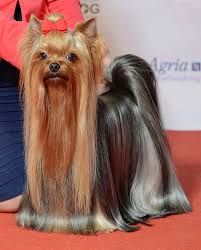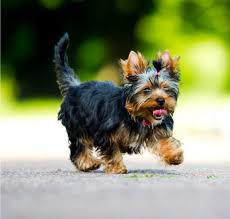The Yorkshire Terrier, also known as the Yorkie, is a small breed of dog that originated in Yorkshire, England during the 19th century. These tiny dogs were originally bred to catch rats in textile mills, but today they are primarily kept as companion animals due to their loving and affectionate nature.
Yorkies are a beloved breed among dog owners due to their adorable appearance, which includes a long, silky coat that comes in shades of tan and blue. Their small size, weighing no more than seven pounds, makes them an ideal pet for people living in apartments or small homes.
Yorkies are a highly intelligent breed and are known for their loyalty and devotion to their owners. They are also incredibly social animals, making them excellent pets for families with children and other pets. Despite their small size, they are energetic and love to play, making them an ideal companion for an active person.
One of the unique characteristics of the Yorkie breed is their lively and confident personality. They are not afraid to speak their minds and are not shy about voicing their opinions. They can be stubborn at times, but with patience and consistent training, they can be taught to behave appropriately in all situations.
One of the challenges of owning a Yorkie is their grooming needs. Their long, silky coat requires regular brushing to keep it from matting, and they also need frequent haircuts to keep their fur at a manageable length. Owners must also be vigilant about dental care, as Yorkies are prone to dental issues such as tooth decay and gum disease.
In terms of health, Yorkies are generally a robust breed. However, they are prone to some genetic health issues, including patellar luxation (a kneecap that moves out of place), liver shunt (a condition in which the liver is not able to filter toxins properly), and hypoglycemia (low blood sugar). Regular vet check-ups are essential to keep a Yorkie healthy and happy.
Yorkies are an adorable and loving breed of dog that make excellent pets for families and individuals alike. Their small size and energetic personalities make them a joy to be around, and their intelligence and loyalty ensure that they will be a beloved member of the family for years to come. While their grooming needs can be challenging, the rewards of owning a Yorkie far outweigh any difficulties.
Read Also: All you need to know about the Basenji Dog
History and Origin of Yorkie Terrier Dogs

The earliest ancestors of the breed were larger than today’s Yorkies, and were used for hunting and vermin control. As the Industrial Revolution took hold in England, the need for smaller dogs that could fit in tight spaces and catch rats in factories grew, leading to the development of the smaller Yorkie we know today.
In the early 1860s, the breed was officially recognized by the Kennel Club in England, and by the late 1800s, the breed had become a popular pet in high society circles. Yorkies were imported to the United States in the late 1800s, and quickly became a popular breed among wealthy Americans.
Today, the Yorkie remains a beloved companion animal around the world, and is recognized by major kennel clubs including the American Kennel Club and the United Kennel Club. While the breed’s origins are humble, the Yorkie has become a symbol of refinement and luxury, thanks to its popularity among the wealthy and famous.
Health Issues and lifespan of Yorkie Terrier Dogs
Patellar Luxation: A condition where the kneecap moves out of place, causing pain and difficulty walking.
Hypoglycemia: Low blood sugar, which can cause seizures, weakness, and other symptoms.
Dental Issues: Yorkies are prone to dental problems such as tooth decay and gum disease.
Portosystemic Shunt: A liver condition in which blood flow is redirected around the liver, leading to toxin buildup and other issues.
Legg-Calve-Perthes Disease: A degenerative hip condition that can cause pain and lameness.
Tracheal Collapse: A condition where the cartilage in the trachea weakens, making it difficult for the dog to breathe.
Eye Issues: Yorkies are prone to eye problems such as cataracts, glaucoma, and retinal dysplasia.
To help reduce the risk of these health issues, it is important to feed your Yorkie a healthy diet, provide regular exercise, and schedule routine vet check-ups. Additionally, responsible breeders will screen their breeding dogs for genetic health issues to help reduce the likelihood of passing on these conditions to their offspring.
The average lifespan of a Yorkie is between 12-15 years, which is longer than many other small breeds. However, it is important to note that the lifespan of individual dogs can vary depending on factors such as diet, exercise, genetics, and overall health. Owners can help ensure their Yorkie lives a long and healthy life by providing proper care and regular vet check-ups.
Yorkie Terrier Dog Breed Complete Grooming and Care Guide

Brushing: Your Yorkie’s coat should be brushed at least once a day to prevent tangles and matting. Use a slicker brush or a comb to gently remove any knots and keep the coat smooth and shiny. Be sure to brush all the way down to the skin to prevent mats from forming.
Bathing: Your Yorkie should be bathed once every 4-6 weeks using a mild dog shampoo. Be sure to rinse thoroughly to remove all soap residue, which can irritate your dog’s skin. Avoid getting water in your dog’s ears, as this can lead to ear infections.
Haircuts: Your Yorkie’s long hair should be trimmed every 6-8 weeks to prevent it from getting too long and unmanageable. Take your dog to a professional groomer to ensure a clean and even cut.
Dental Care: Yorkies are prone to dental issues, so it is important to brush your dog’s teeth regularly using a soft-bristled toothbrush and dog-friendly toothpaste. You can also provide your dog with dental chews or toys to help keep their teeth clean.
Nail Trimming: Your Yorkie’s nails should be trimmed every 4-6 weeks to prevent them from getting too long and causing discomfort. Use a sharp nail clipper and be careful not to cut the quick, which is the blood vessel inside the nail.
Ear Care: Yorkies have long, floppy ears that can trap dirt and moisture, leading to infections. Clean your dog’s ears regularly using a cotton ball or soft cloth dampened with an ear cleaning solution recommended by your vet.
Exercise: Yorkies are energetic dogs that require regular exercise to stay healthy and happy. Take your dog for daily walks or playtime in the yard to keep them active and engaged.
Health Care: Regular vet check-ups are essential to keeping your Yorkie healthy and detecting any health issues early on. Be sure to keep up with vaccinations, parasite prevention, and any other recommended medical treatments.
By following these grooming and care tips, you can help ensure your Yorkie stays healthy, happy, and looking their best.
Yorkie Puppies

Socialization: Yorkie puppies should be socialized from a young age to help them develop confidence and good behavior around people and other animals. Socialization can include exposure to different people, animals, and environments.
House Training: Potty training a Yorkie puppy can be challenging, as they have small bladders and need to go out frequently. Consistency and patience are key to successful house training.
Feeding: Yorkie puppies should be fed a high-quality puppy food that is appropriate for their size and age. Puppies may need to be fed several small meals throughout the day to maintain their energy and growth.
Exercise: While Yorkie puppies are small, they still need daily exercise to stay healthy and happy. Short walks, playtime, and interactive toys can help keep them active and engaged.
Vaccinations: Puppies should receive a series of vaccinations to protect them against common diseases. It is important to follow your vet’s recommended vaccination schedule to ensure your puppy stays healthy.
Grooming: Yorkie puppies have long, silky coats that require regular grooming to prevent matting and tangles. Brush your puppy’s coat daily and take them to a professional groomer for haircuts and nail trimming.
Training: Yorkie puppies are intelligent and eager to please, but they can be stubborn at times. Consistent training and positive reinforcement can help your puppy learn good behavior and obedience.
Remember, raising a Yorkie puppy requires time, patience, and commitment. With proper care and attention, your puppy can grow into a happy and healthy adult dog that brings you years of joy and companionship.
Yorkie Poodle
Appearance: Yorkie Poodles can vary in size and appearance depending on the size of the Poodle parent. They typically have curly or wavy coats that are low shedding and hypoallergenic. They come in a variety of colors, including black, white, brown, and grey.
Temperament: Yorkie Poodles are playful, friendly, and affectionate dogs. They are known for their high energy and love of playtime, making them great companions for families with children. They are also intelligent and easy to train, making them ideal for first-time dog owners.
Exercise: Yorkie Poodles require daily exercise and playtime to maintain their energy and stay healthy. They enjoy walks, playing fetch, and other interactive games.
Grooming: Yorkie Poodles have a low shedding coat that requires regular grooming to prevent matting and tangling. They should be brushed several times a week and taken to a professional groomer for haircuts and nail trimming.
Health: Like all hybrid breeds, Yorkie Poodles can be prone to certain health issues, including hip dysplasia, eye problems, and allergies. It is important to choose a reputable breeder and schedule regular vet check-ups to ensure your dog stays healthy.
Overall, Yorkie Poodles are loving and playful companions that are well-suited for families and individuals looking for a hypoallergenic and intelligent dog. With proper care and attention, they can make wonderful pets that bring joy and companionship to their owners.
Read Also: How Fortified Molasses helps for Survival Feeding of Beef Cattle
Where to Find Yorkie Puppies or Teacup Yorkie for Sale near Me/You

Local Breeders: Start by searching for reputable Yorkie breeders in your area. Look for breeders who have a good reputation and who prioritize the health and well-being of their dogs. You can check online directories, ask for recommendations from your vet or local dog clubs, or attend dog shows to meet breeders in person.
Online Marketplaces: There are several online marketplaces that list Yorkie puppies for sale, such as PuppyFind, NextDayPets, and Greenfield Puppies. However, it is important to exercise caution when purchasing a puppy online and to thoroughly research the breeder before making a purchase.
Animal Shelters and Rescues: Consider adopting a Yorkie puppy from a local animal shelter or rescue organization. While it may take some time to find a Yorkie puppy through a shelter or rescue, adopting a dog can be a rewarding experience and can provide a loving home to a dog in need.
Pet Stores: While some pet stores may have Yorkie puppies for sale, it is important to be cautious when purchasing from a pet store. Many pet stores source their puppies from puppy mills, which can have negative impacts on the health and well-being of the dogs.
Regardless of where you find a Yorkie puppy for sale, it is important to ask the breeder or seller questions about the dog’s health, socialization, and temperament. Take the time to research and choose a reputable breeder or organization to ensure that your new puppy is healthy and well-cared for.
The Teacup Yorkie

While Teacup Yorkies are undeniably cute and adorable, it is important to note that breeding dogs to be unnaturally small can have negative effects on their health and well-being. Some Teacup Yorkies can be prone to health problems such as hypoglycemia, respiratory issues, dental problems, and liver shunts.
If you are considering getting a Teacup Yorkie, it is important to do your research and find a reputable breeder who prioritizes the health and well-being of their dogs. Make sure to ask the breeder about the dog’s parents’ health history, as well as any health testing that has been done on the puppy.
It is also important to note that Teacup Yorkies require extra care and attention due to their small size. They need to be fed a high-quality diet that is appropriate for their size, and they may require more frequent meals throughout the day to avoid hypoglycemia.
Teacup Yorkies can make great pets for the right family, but it is important to be aware of the potential health issues and to find a responsible breeder who prioritizes the health and well-being of their dogs. If you are considering getting a Teacup Yorkie, be sure to do your research and speak with a veterinarian to ensure that you are prepared to give them the care and attention they need.
Read Also: Stockton Recycling Inc. Leading the Way in Eco-Friendly Waste Management





